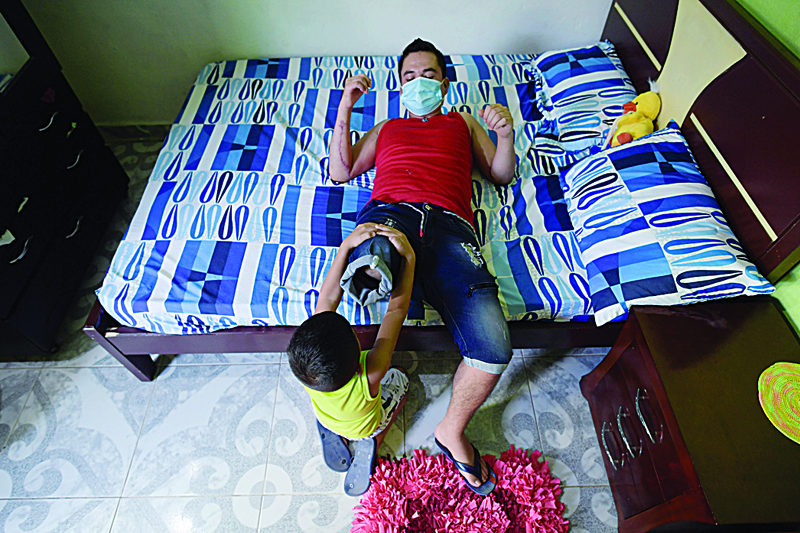 CATATUMBO, Colombia: Ivan Rodriguez, 25, victim of a landmine, does physical therapy with his stepson Moises at their house in Catatumbo, Norte de Santander department, Colombia.-AFP
CATATUMBO, Colombia: Ivan Rodriguez, 25, victim of a landmine, does physical therapy with his stepson Moises at their house in Catatumbo, Norte de Santander department, Colombia.-AFPCATATUMBO, Colombia: Twice in 10 years, Efrain Soto's life was shattered in landmine explosions in violence-wracked Colombia. The first one robbed him of his eye, the second one killed his brother. The number of landmine victims is rising in Colombia, as guerrilla violence continues despite a 2016 peace accord meant to end decades of armed conflict. In the Catatumbo region in northern Colombia, on the border with Venezuela, the sight of people dying or suffering terrible wounds from mines is all too familiar.
Since the explosions, Soto has had a nervous breakdown and seizures. For the past eight years, he has been taking medication to help with the psychological trauma, but he is still so distressed that even walking to a nearby village terrifies him. "I want to cry, I want to run, I'm afraid," said Soto. While the government has signed an historic peace accord with the Revolutionary Armed Forces of Colombia (FARC) to end a long-running civil war, it did not rid the country of guerrillas and violence.
Territories rife with illegal coca plantations, where the FARC once held sway, are now infested with leftist guerrillas, right-wing paramilitaries and armed drug traffickers laying landmines indiscriminately. The number of people killed or wounded by mines is increasing, according to the International Committee of the Red Cross. In 2020, there were 389 blast victims, compared to 57 in 2017. During the first six months of this year alone, 263 people, including 21 children, were killed or maimed.
Lost hope
In 2011, Soto was talking to his wife on his mobile phone just yards (meters) from his house when he was shaken by an explosion. Blood started pouring from his eye. Relatives made a makeshift stretcher and hammock to take Soto, who is over 6 feet 3 inches (1.94 meters) tall, on a five-hour trek along countryside trails to bring him to a hospital in the regional center of Cucuta, where he spent four months in treatment.
In April of last year, Soto's 41-year-old brother Carlos accidentally set off another landmine, and the ordeal was repeated. "Running away, looking for the hammock, rushing to the village again, and he was bleeding," Soto recalled. When Carlos arrived at the village of Tibu, still some ways away from Cucuta, "his lips were purple" and he died, Soto said. Since the peace deal, Colombia has de-mined 448 out of its 1,122 municipalities, but there are 137 that "do not have the necessary conditions" to be rendered safe, said the office of Colombia's High Commissioner for Peace.
Catatumbo is in that group, with violence an ongoing scourge in the area. No sooner had Soto overcome his grief from his brother's death, he was randomly shot in the stomach and spent another month in hospital in Cucuta. Soto says he has lost hope of seeing peace in Colombia.
'Phantom limb'
In April, Ivan Rodriguez was cutting down a tree when he heard a blast and was engulfed by "smoke and earth." The 24-year-old managed to stay "conscious" and "calm" during the near three hours it took him to reach a hospital. Rodriguez lost his right foot and came close to having his injured arm amputated. With little medical supervision, he is now recovering at home with help from his wife and five-year-old son. Rodriguez is suffering from a phantom limb, a condition in which a person vividly perceives and feels pain from a lost limb. He hopes to get a "prosthesis to be able to walk" and play football again.
His 23-year-old wife, Paola Acuna, marvels at his bravery. "Rather than us giving him strength, he gives a lot to us," she said. "You're not the same anymore," explained Rodriguez. "But I try to keep going because why make yourself feel even worse when you know the foot won't grow back." With over 2,200 dead and more than 8,000 wounded between 1999 and 2017, according to watchdog Landmine and Cluster Munition Monitor, Colombia is one of the countries worst affected by landmines after Syria and Afghanistan. - AFP










